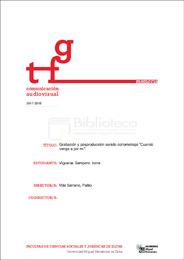Please use this identifier to cite or link to this item:
https://hdl.handle.net/11000/26728Full metadata record
| DC Field | Value | Language |
|---|---|---|
| dc.contributor.advisor | Mas Serrano, Pablo | - |
| dc.contributor.author | Vigueras Sempere, Irene | - |
| dc.contributor.other | Departamentos de la UMH::Ciencias Sociales y Humanas | es_ES |
| dc.date.accessioned | 2022-05-02T10:31:58Z | - |
| dc.date.available | 2022-05-02T10:31:58Z | - |
| dc.date.created | 2018-09-17 | - |
| dc.identifier.uri | http://hdl.handle.net/11000/26728 | - |
| dc.description.abstract | En este trabajo se documenta la planificación y el desarrollo del proyecto audiovisual “Cuando venga a por mí”. Como en toda obra audiovisual, la producción consta de 3 etapas clave, preproducción, producción y posproducción. La primera etapa es la preproducción, en la cual se planifica el trabajo a realizar. La segunda etapa es la producción, en la cual se graban todas las secuencias audiovisuales planeadas en la preproducción y todos los recursos necesarios para su posterior montaje y edición en base a la planificación realizada en la anterior etapa. La tercera y última etapa es la posproducción. En ésta se monta cada plano en función del guion y de las indicaciones del director del cortometraje. Al finalizar la edición, se obtiene un único archivo de vídeo, el cual se sonoriza posteriormente en base a los recursos grabados, efectos de librería y efectos de procesado de señal. Curiosamente el trabajo del sonidista participa en las tres etapas, si bien es cierto que el trabajo más exhaustivo corresponde a las etapas de producción y posproducción Finalizadas correctamente las tres etapas del proyecto audiovisual, se obtiene un producto único y sencillo listo para su difusión. | es_ES |
| dc.description.abstract | This document is based in the planning and development of the audiovisual project "Cuando venga a por mí". As in every audiovisual works, production consists of three main stages: pre-production, production and postproduction. The first step is the pre-production stage, in which the work to be done is planned; including the selection of personnel, the necessary material and the time planning to shoot the short film; and finally, its subsequent edition. The second phase is the production, in which all the audiovisual sequences planned in the pre-production are recorded and all the necessary resources for their subsequent editing are selected, keeping in mind the planning carried out in the previous phase. At the end of the editing, a single video file is obtained, which is then sounded with the recorded resources, library effects and signal processing effects. And finally, the short film soundtrack is created, which is added to the other soundtracks to obtain a final audio track. This track is mastered according to the medium of short film reproduction. Strangely enough, the sound engineer's work takes part in all three stages, although it is true that the most exhaustive work corresponds to the production and post-production stages. Once the three stages of the audiovisual project have been successfully completed, a unique and simple product is obtained, ready for distribution. | es_ES |
| dc.format | application/pdf | es_ES |
| dc.format.extent | 50 | es_ES |
| dc.language.iso | spa | es_ES |
| dc.publisher | Universidad Miguel Hernández de Elche | es_ES |
| dc.rights | info:eu-repo/semantics/openAccess | es_ES |
| dc.rights.uri | http://creativecommons.org/licenses/by-nc-nd/4.0/ | * |
| dc.subject | grabación | es_ES |
| dc.subject | sonido directo | es_ES |
| dc.subject | posproducción de sonido | es_ES |
| dc.subject | audiovisual | es_ES |
| dc.subject | shortfilm | es_ES |
| dc.subject | recording | es_ES |
| dc.subject | direct sound | es_ES |
| dc.subject | sound posproduction | es_ES |
| dc.subject | sound effects | es_ES |
| dc.subject.other | CDU::3 - Ciencias sociales: 316 - Sociología. Comunicación | es_ES |
| dc.title | Grabación y posproducción sonido cortometraje "Cuando venga a por mí" | es_ES |
| dc.type | info:eu-repo/semantics/bachelorThesis | es_ES |

View/Open:
TFG-Vigueras Sempere, Irene.pdf
1,38 MB
Adobe PDF
Share:
.png)
